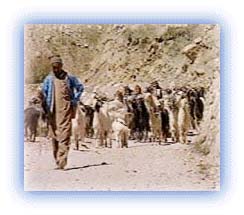Ladakh himalayas
General Info
· Villages
· Valleys and plateaus
· Lakes
· Passes
· Glaciers
· Rivers
· People
· Ladakhis
· Livelihood
· Shia Muslims of Kargil
· Occupations
· Gujjars
· Brokpas
· Tradition and Culture
· Livelihood
· Baltis
· Livelihood
· Religion, tradition, culture
· Changpas
· Livelihood
· Tradition and Culture
· Religion
· Fairs and festivals
· Other places of interest

![]()
| Religion, traditions and culture The Baltis belong to the Shia sect of Islam. Being highly religious, they hold their religious leaders, the Aghas, in very high esteem and reverence, which is perhaps unparalleled anywhere in the world. The word of the Agha is law to the Shias. They have a unique cult of ceremonial cleanliness which is an essential part of their religion and culture. It is a taboo for them to use any article such as water and food that may have been touched by a non-Muslim, whether it be a Hindu or a Buddhist. This can even apply to vegetables in a shop which may have been inadvertently touched by a non-Muslim. In fact, there was a time when the Baltis would not use even medicines given by a non-Muslim doctor. In recent times, however, such attitudes have been changing. |
 |
| Balti herdsman with his flock at Kargil. Credit: Karamjeet Singh |
There was a time when the Shia Balti regarded merry-making and innocent entertainment as being against the principles of his faith. Over the years such rigid religious attitudes have softened.
Among Shia Baltis, matrimonial relations are greatly influenced by a system of temporary marriage known as 'muta'. Under this system, all marriages are temporary and contracted for a definite period of time that has to be agreed upon by both parties before the marriage takes place. The period of temporary marriage may vary from a week to many years. Thereafter both the parties are free either to continue the relation for another period of specified time or terminate it.
All rights reserved